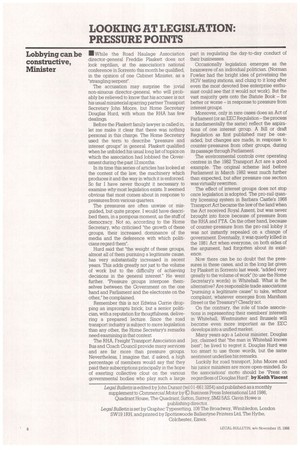Lobbying can be constructive, Minister
Page 52

If you've noticed an error in this article please click here to report it so we can fix it.
• While the Road Haulage Association director-general Freddie Plaskett does not look reptilian, at the association's national conference in Sorrento this month he qualified, in the opinion of one Cabinet Minister, as a "strangling serpent".
The accusation may surprise the jovial non-sinuous director-general, who will probably be relieved to know that his accuser is not his usual ministerial sparring partner Transport Secretary John Moore, but Home Secretary Douglas Hurd, with whom the RHA has few dealings.
Before the Plaskett family lawyer is called in, let me make it clear that there was nothing personal in this charge. The Home Secretary used the term to describe "pressure and interest groups" in general. Plaskett qualified when he unfolded his usual long list of topics on which the association had lobbied the Government during the past 12 months.
In its time this series of articles has looked at the content of the law, the machinery which produces it and the way in which it is enforced. So far I have never thought it necessary to examine why most legislation exists. It seemed obvious that most comes about in response to pressures from various quarters.
The pressures are often unwise or misguided, but quite proper. I would have described them, in a pompous moment, as the stuff of democracy. Not so, according to the Home Secretary, who criticised the growth of these groups, their increased dominance of the media and the deference with which politicians regard them".
Hurd said that "the weight of these groups, almost all of them pursuing a legitimate cause, has very substantially increased in recent years. This adds greatly not just to the volume of work but to the difficulty of achieving decisions in the general interest." He went further. "Pressure groups interpose themselves between the Government on the one hand and Parliament and the electorate on the other,'' he complained.
Remember this is not Edwina Currie dropping an impromptu brick, but a senior politician, with a reputation for thougtfulness, delivering a prepared lecture. Since the road transport industry is subject to more legislation than any other, the Home Secretary's remarks need examining in that context.
The RHA, Freight Transport Association and Bus and Coach Council provide many services and are far more than pressure groups. Nevertheless, I imagine that, if asked, a high percentage of members would say that they paid their subscriptions principally in the hope of exerting collective clout on the various governmental bodies who play such a large part in regulating the day-to-day conduct of their businesses.
Occasionally legislation emerges as the brainwave of an individual politician. (Norman Fowler had the bright idea of privatising the HGV testing stations, and clung to it long after even the most devoted free enterprise enthusiast could see that it would not work), But the vast majority gets onto the Statute Book for better or worse in response to pressure from interest groups.
Moreover, only in rare cases does an Act of Parliament (or an EEC Regulation the process is fundamentally the same) reflect the aspirations of one interest group. A Bill or draft Regulation as first published may be onesided, but changes are made, in response to counter-pressures from other groups, during its passage through Parliament.
The environmental controls over operating centres in the 1982 Transport Act are a good example. The original scheme laid before Parliament in March 1982 went much further than expected, but after pressure one section was virtually rewritten.
The effect of interest groups does not stop once legislation is adopted. The pro-rail quantity licensing system in Barbara Castle's 1968 Transport Act became the law of the land when the Act received Royal Assent, but was never brought into force because of pressure from the RHA and FTA. On the other hand, because of counter-pressure from the pro-rail lobby it was not instantly repealed on a change of government. Eventually, it was quietly killed in the 1981 Act when everyone, on both sides of the argument, had forgotten about its existence.
Now there can be no doubt that the pressures in these cases, and in the long list given by Plaskett in Sorrento last week. "added very greatly to the volume of work" (to use the Home Secretary's words) in Whitehall. What is the alternative? Are responsible trade associations "pursuing a legitimate cause" to take, without complaint, whatever emerges from Marsham Street or the Treasury? Clearly not.
On the contrary, the role of trade associations in representing their members' interests in Whitehall, Westminster and Brussels will become even more important as the EEC develops into a unified market.
Many years ago a Labour minister, Douglas Jay, claimed that "the man in Whitehall knows best"; he lived to regret it. Douglas Hurd was too smart to use those words, but the same sentiment underlies his remarks.
Luckily for road transport, John Moore and his junior ministers are more open-minded, So the associations' motto should be "Press on regardless of Douglas Hurd". by Keith Vincent






























































































